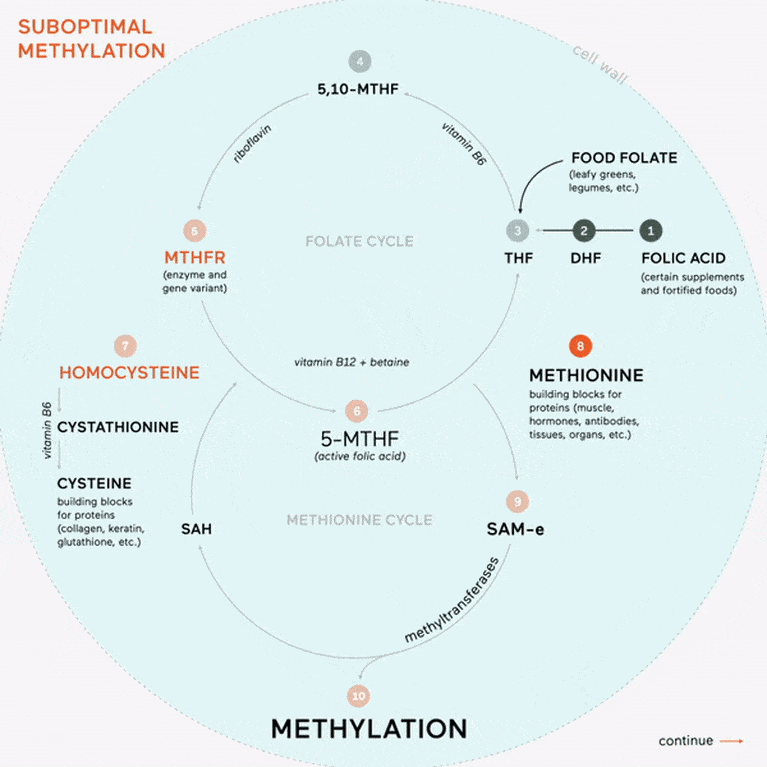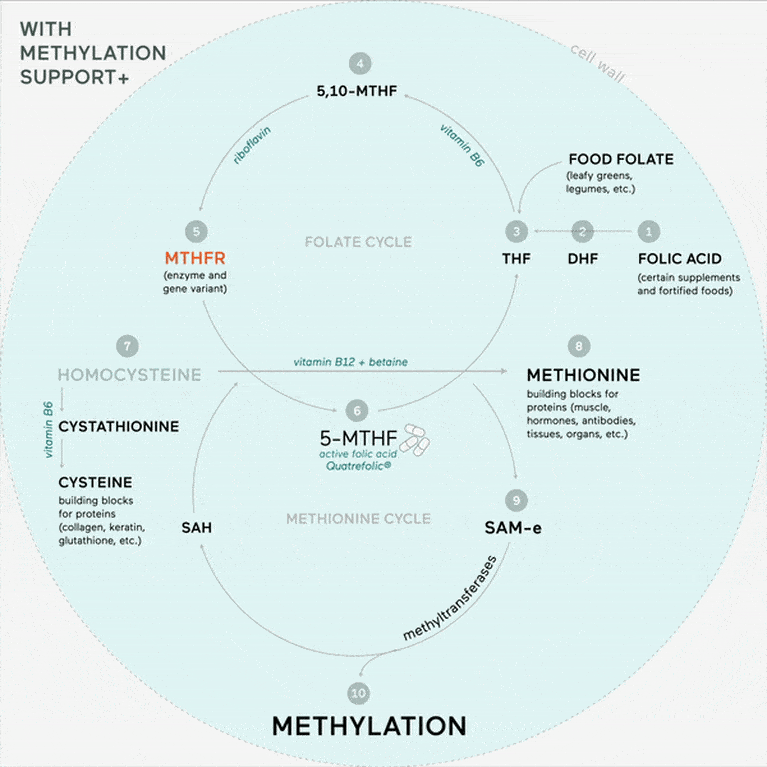50% Of The U.S. Has This Gene Variant That Impacts Heart & Brain Health
Chances are, you or someone you love has an MTHFR gene variation.


Though it reads like texting lingo for an obscene profanity, we should all be thanking MTHFR profusely for its contribution to our health—not cursing about it. This rockstar gene is responsible for keeping our methylation cycles running smoothly and affects everything from heart and brain function to energy levels and detoxification.
MTHFR is a gene that we all carry two copies of (one from each parent). This gene serves as the code for an enzyme called methylenetetrahydrofolate reductase (aka “the MTHFR enzyme”) that is responsible for activating folic acid, an essential B vitamin. This enzyme plays a vital, daily role fully activating folate (into its 5-MTHF, 5-methyltetrahydrofolate, form) so it can be used in every cell of the body to produce healthy homocysteine levels, red blood cells, neurotransmitters, DNA, and more.*
The MTHFR enzyme is crucial for a biological process called methylation that occurs approximately one billion times per second and affects just about every cell, system, and process in the body—including cardiovascular function, neurological activities, energy production, detoxification, and more.
In other words? It’s kind of a big deal.
The MTHFR gene variations.
As it turns out, a whopping 150 million Americans have individual genetic variations in the MTHFR gene that impact the production and efficiency of the MTHFR enzyme and, subsequently, result in varying degrees of suboptimal methylation function. These MTHFR gene variants affect how efficiently the MTHFR enzyme converts folate (which is found in food) and folic acid (the form of folate found in fortified foods and certain supplements) into its active 5-MTHF form, which helps regulate homocysteine levels (i.e., by converting homocysteine to methionine) and fuel methylation.*
Translation? There’s about a 50/50 chance that your body isn’t processing folate as efficiently as it could be thanks to an MTHFR gene variation, which can lead to high homocysteine levels. Left unchecked, this burden of homocysteine can result in cardiovascular, neurological, DNA, and reproductive health implications.

The good news? Suboptimal methylation in those with MTHFR gene variations can be solved with targeted supplementation and intentional dietary and lifestyle changes.* In fact, many people have one or more gene variations but don’t even realize it because they’re maintaining a healthy methylation cycle through diet and lifestyle choices.
What you can do if you have an MTHFR gene variant.
The MTHFR enzyme is less efficient in individuals with an MTHFR gene variant, so ensuring that homocysteine levels are healthy and methylation is functioning as it should is key. Many folks have one or more copies of an MTHFR single nucleotide polymorphism (SNP), yet address their needs for methylation nutrients, cofactors, and substrates quite well through diet, lifestyle choices, and proper supplementation.*

Physician Karyn Shanks, M.D., explains that she counsels individuals with MTHFR variations about the potential to develop suboptimal methylation concerns in light of their genetics, then reviews what they need to do to bypass that potential issue. “I also explain the important difference between genetic potential and functional outcome (epigenetics!),” she adds.
Luckily, there are actions you can take that will help promote a healthy methylation cycle if you happen to have an MTHFR gene variation:
One half of the population needs a little extra methylation support (on the daily) thanks to genetic variations in their MTHFR genes. Thankfully, intentional nutrition, lifestyle, and targeted supplement choices can support these individuals and ensure their methylation cycles run smoothly.*
mbg’s methylation support+ is a gene-focused solution we created to support MTHFR gene variant pathways.* With a full array of bioactive B vitamins—including Quatrefolic® methylfolate (5-MTHF) plus activated B2, B6, B12, and betaine—this high-quality, ultra-potency complex promotes healthy methylation, which is essential for everything from cardiovascular, neurological, and reproductive health to energy production, detoxification, and longevity.*
If you are pregnant, breastfeeding, or taking medications, consult with your doctor before starting a supplement routine. It is always optimal to consult with a health care provider when considering what supplements are right for you.
https://www.mindbodygreen.com/articles/half-the-population-has-an-mthfr-gene-variation

 Konoly
Konoly 
































